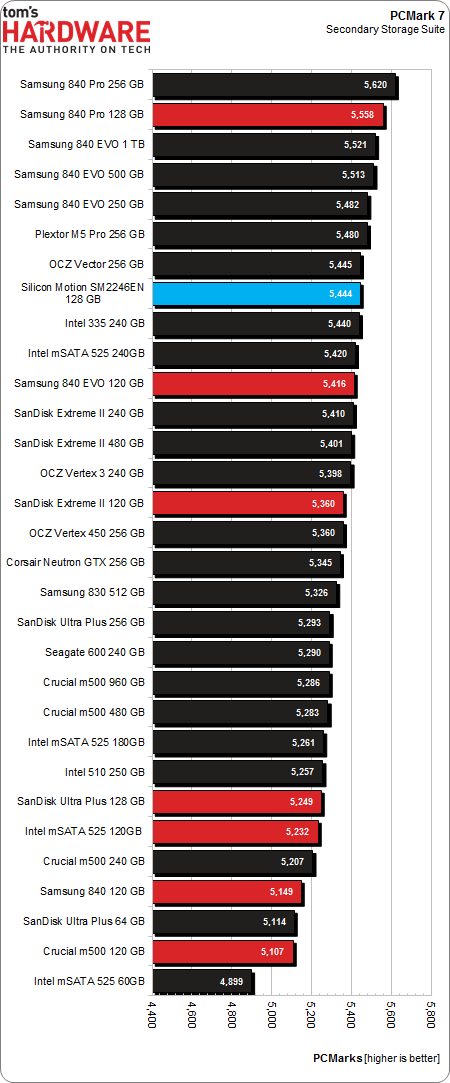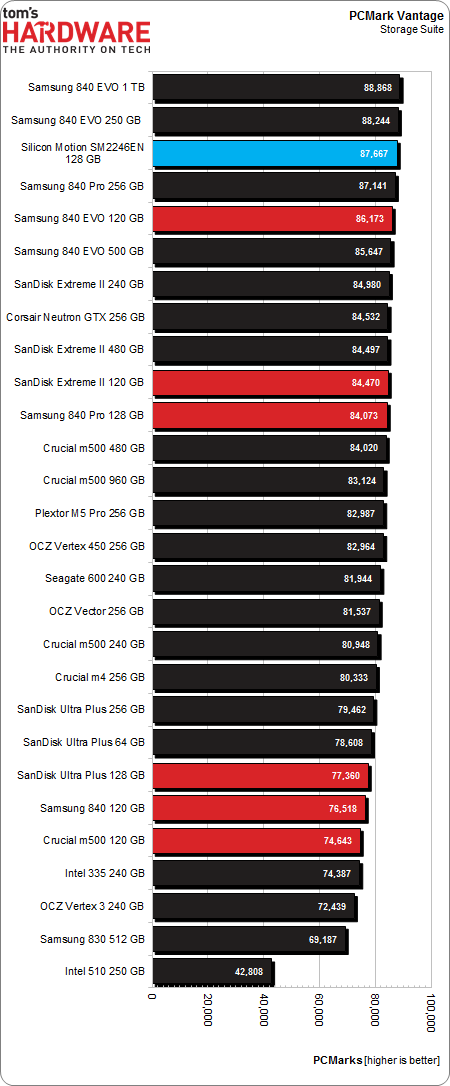Hands-On With Silicon Motion's New SSD Controller
Silicon Motion already makes flash storage controllers in all shapes and sizes. Now, with a new SATA 6Gb/s processor ready for action, the Taiwanese firm is hoping to make a dent in the market share currently enjoyed by SandForce and Marvell.
Results: PCMark 7 And PCMark Vantage
Futuremark's PCMark 7: Secondary Storage Suite
PCMark 7 uses the same trace-based technology as our Storage Bench v1.0 for its storage suite testing. It employs a geometric mean scoring system to generate a composite, so we end up with PCMarks instead of a megabytes per second. One-thousand points separate the top and bottom, but that encompasses a far larger difference than the score alone indicates.
This test is a big improvement over the older PCMark Vantage, at least for SSD benchmarking. The storage suite is comprised of several small traces. At the end, the geometric mean of those scores is scaled with a number representing the test system's speed. The scores generated are much different from PCMark Vantage, and many manufacturers are predisposed to dislike it for that reason. It's hard to figure out how PCMark 7 "works" because it uses a sliding scale to generate scores. Still, it represents one of the best canned benchmarks for storage, and if nothing else, it helps reinforce the idea that the differences in modern SSD performance don't necessarily amount to a better user experience in average consumer workloads.
In Futuremark's well-balanced PCMark 7 storage suite, Silicon Motion's sample outpaces every other sub 256 GB-class SSD (and even a few of those larger models, too). Samsung's 840 Pro is unassailable, but Silicon Motion's drive remains a strong contender.
Futuremark's PCMark Vantage: Hard Drive Suite
PCMark's Vantage isn't the paragon of SSD testing, mainly because it's old and wasn't designed for the massive performance solid-state technology enables. Intended to exploit the new features in Windows Vista, Vantage was certainly at the forefront of consumer storage benching at the time. Vantage works by taking the geometric mean of composite storage scores and then scaling them a lot like PCMark 7 does. But in Vantage's case, this scaling is achieved by arbitrarily multiplying the geometric sub-score mean by 214.65. That scaling factor is supposed to represent an average test system of the day (a system that's now close to a decade behind the times). PCMark 7 improves on this by creating a unique system-dependent scaling factor and newer trace technology.
Why bother including this metric, then? A lot of folks prefer Vantage in spite of or because of the cartoonish scores and widespread adoption. That, and the fact that most every manufacturer uses the aged benchmark in box specs and reviewer-specific guidelines. In fairness, Vantage's Hard Drive suite wasn't designed with SSDs in mind, and is actually quite good as pointing out which 5400 RPM mechanical disk might be preferable.
Get Tom's Hardware's best news and in-depth reviews, straight to your inbox.
Silicon Motion generates a crazy-high score, even beating out Samsung's 840 Pro 128 GB. Clearly, better 4 KB performance at lower queue depths is helping the new controller's case. Because, yeah, 87,000 PCMarks is a lot. The only two drives ahead of Silicon Motion are 840 EVOs, both which achieve almost-herculean performance at low queue depths.
Current page: Results: PCMark 7 And PCMark Vantage
Prev Page Results: Tom's Hardware Storage Bench v1.0, Continued Next Page Results: Robocopy File Transfer-
rolli59 Performance looks good, the question is with a new player on the market if it will affect market price to the benefit of users that have SSD boot/program drives up to 256GB.Reply -
4745454b While performance wasn't the best, it was more then acceptable. And then the power numbers looked great. Overall it's a great start. I'm interested in long term results as some controllers have had bugs in the past that have done bad things to people's data.Reply
And yes, great to see someone else enter in. While more players means you'll need to look harder at what SSD you are buying, at least we'll have the options. Which is always good, even if the options aren't as good as what you were hoping for. -
shin0bi272 Not that this isnt kinda cool but Taiwan is now part of China so its proper to call it China.Reply -
UmeNNis Reply11339051 said:Not that this isnt kinda cool but Taiwan is now part of China so its proper to call it China.
Ummm..... how exactly is "Taiwan now part of China"...?:sarcastic: -
mayankleoboy1 During the benchmarks, did you ensure that the Samsung EVO is not throttling due to high temps ?Reply
Maybe add a max temperature graph as well. -
e-z e Given time to mature this could be a real contender. Would love to see a follow-up once it hits the market.Reply -
zads Reply
If only this were the case, my job would be so much easier.11337088 said:Meanwhile, SandForce is the opposite. It'll sell you a turnkey solution, but you don't really get many knobs or dials in terms of customization.

